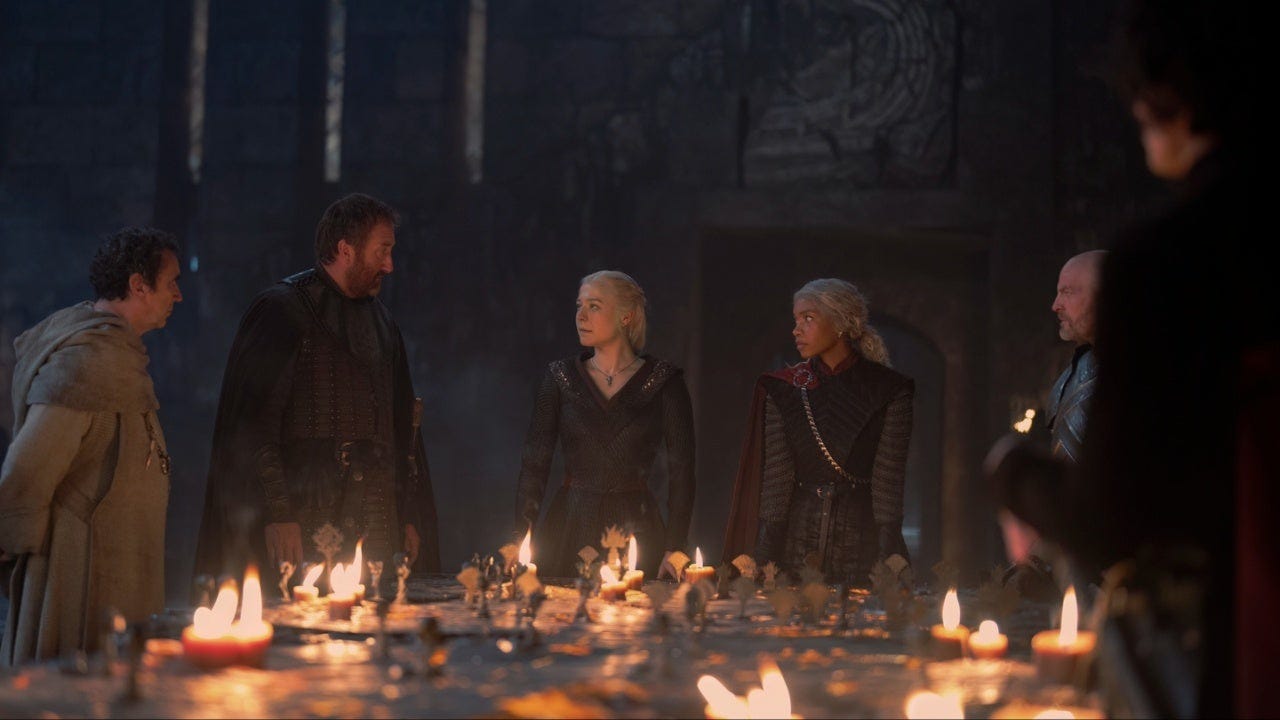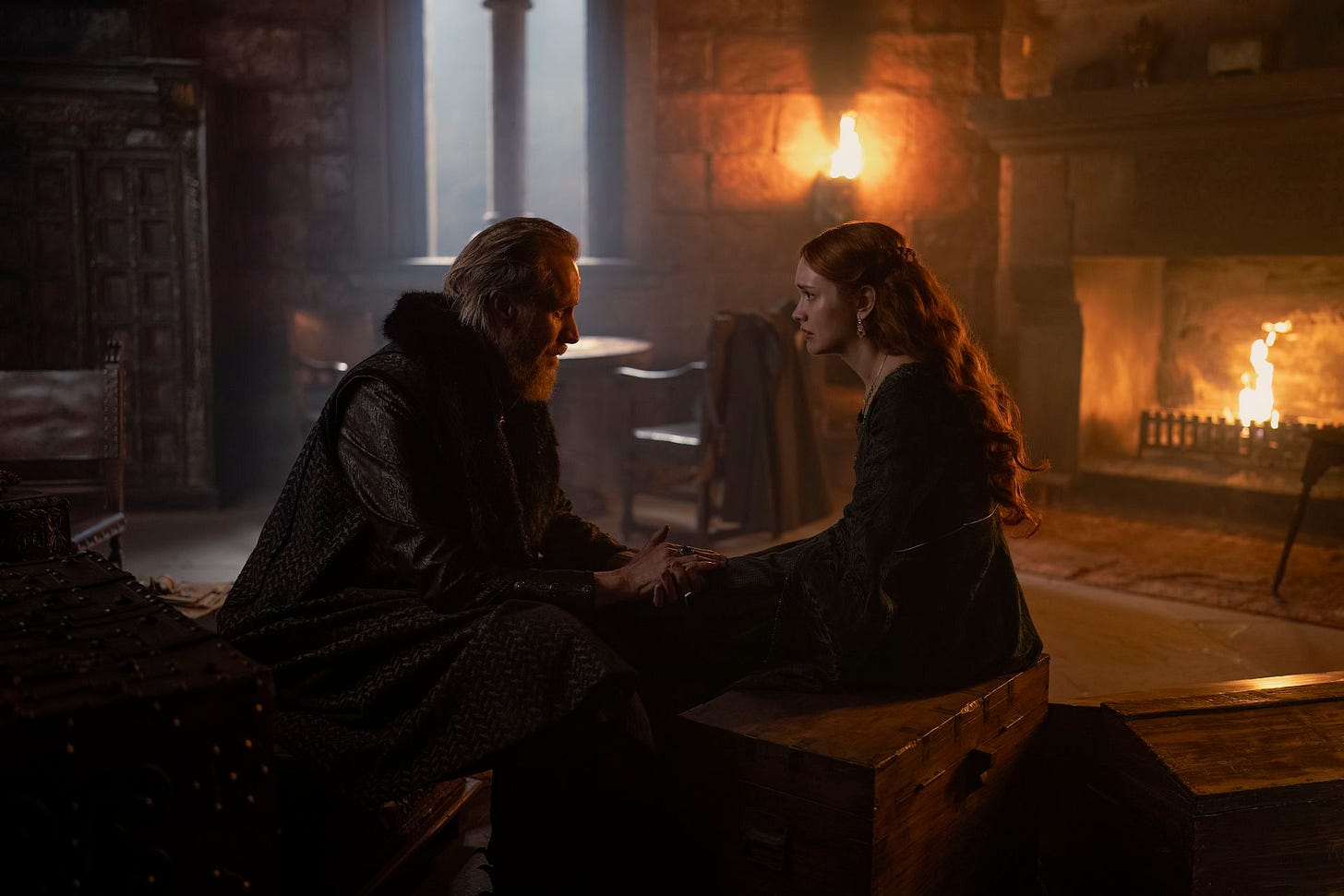Why House of the Dragon Season Two Isn’t Working (So Far)
Lacking an overarching theme, Season Two remains adrift and directionless, wasting time on characters who offer very little and ignoring character who offer so much.
With six episodes now available, House of the Dragon has exceeded the half-way mark of its second season and it’s safe to say that it has not lived up to fans’ expectations. While the viewing figures continue to climb ever higher with each following episode and the show still commands an active fanbase on social media, underneath this facade, there are simmering problems, highlighting a noticeable decline in the writing quality.
Unlike the preceding season, which had a clear impetus – laying the foundations for the Targaryen civil war – this new one is, perhaps like the Velaryon ships blockading the Gullet, adrift and directionless, vacillating from one scene to the next without an overarching theme to guide it. Both sides are at war, yes, but instead of action, most of the time is wasted on characters mulling and wallowing in self-pity, often with no signs of evolving.
The second season is, by no means, a bad show. Far from it. Every scene still permeates with the high-production quality expected of a prestigious HBO show. From elegant designer dresses to grandiose set pieces to CGI dragons battling on screen (albeit rarely), every dollar spent on House of the Dragon has been used to its best effect.
Alicent Hightower, played fabulously by Olivia Cooke, remains a Renaissance portrait of melancholy, grappling with the events she has inadvertently set in motion, and Emma D’arcy, as Rhaenyra Targaryen, elevates every scene with their presence, conveying a myriad of emotions often with just a simple expression. Other adept actors allow sombre or bright moments to juxtapose with finesse. As its greatest asset, the cast excels, augmenting the show with their versatile skills.
Yet, when it comes to the writing and, more specifically, the time allocation afforded to certain characters, the second season leaves a lot to be desired. Having been trimmed down from 10 episodes to 8, time is a more valuable commodity than ever before, so it’s bewildering to see so much precious screen time wasted on characters and subplots that go virtually nowhere. The genesis of the criticism stems from the show-runners’s decision to keep the narrative’s focus revolving around the Rhaenyra and Alicent relationship so pivotal to the first season. While that may have had relevance at the beginning of the story when their feud acted as the catalyst for the war breaking out, as armies are mustered and children are slain, the preservation of this childhood link is tonally jarring.
Instead of moving on from the dynamic when it had naturally run its course, the show-runners decided to cling steadfastly to a relationship that is inconsistent with the story being told. There is no reasonable explanation for why Alicent and Rhaenyra are still reminiscing about a childhood relationship that ended over 15 years ago, especially as their family members are caught in the crossfire.
The writers have been terrified of portraying the lead female characters with any major flaws, so they have re-imagined the dance as a simple male dominated lust for power. The innocent female rulers simply do their best to find peaceful solutions to this escalating conflict, despite becoming victims in this patriarchal and mysoginistic world. This bastardisation of the original narrative neuters the essence and impetus of the story, that women can be wrathful and vindictive and willing to burn entire kingdoms to not only protect their family, but also in service of their own lust for power and recognition just like any male. It's not a story Hollywood is willing to tell, so instead we have whatever this is.
That insistent need to keep the show’s conflict gravitating around them means time better spent on other characters is wasted on the leading actresses, a decision that would have been welcomed if they had been given more material to work with. Olivia Cooke, despite all of her best efforts, can do no more than look sullen and hopeless as other characters with agency do most of the work, leaving her to be nothing more than a background fixture, a decorative piece embellishing the scene and little else.
Why, for instance, do we need to be treated to a five minute scene of Alicent drinking Moon Tea, or discussing Viserys’ intentions with two separate people: Maester Orwyle and Larys? Why do we need to see Alicent and Criston’s relationship, a dynamic that lacks both chemistry and narrative purpose and which ends abruptly a few episodes after it was first introduced?
The reason scenes like this are most upseting is because they are consuming airtime that should have gone to other characters. Aegon and Helaena, the King and Queen of Westeros, haven't spoken once since their child died. Jace and Baela are both in dire need of development. In the book, Jace was the diplomatic MVP for the Blacks, but in the show we've only seen one instance of this with the Freys. We literally skipped over Jace's time in the North so the actor could mew for four episodes in the background of Rhaenyra's council.
One of the greatest appeals of the earlier seasons of Game of Thrones was that the world always felt expansive because characters acted as if they were real people, with their own complex motives. Even if someone wasn’t shown, their presence would always be felt, either because other characters referenced them or their actions would have reverberations. Compare the small councils, for instance. In Game of Thrones, each member of the King’s council was a well-defined character that the viewer spent time with. Grand Maestar Pycelle was shown to be corrupt and a libertine, Littlefinger and Varys were always scheming, conveyed memorably through verbal spats while they circled the Iron Throne.
In House of the Dragon, that world-building is desperately missing. Characters at both small councils are used as vessels by the writers to provide exposition. They’re not well defined and they’re don’t feel alive for this very reason. Aside from maybe Larys, who was given development in the first season, so already feels established, all of the members just exist in that one particular room, called when they’re needed and dismissed when they’re not.
The lack of screen time is not just limited to the small council members.
As Queen of the Seven Kingdoms and a prolific dragonrider, Helaena should realistically be fundamental to the story and yet she appears sporadically, used to give some esoteric reference to her visions and then disappear until the story feels the need to involve her again. Nothing is known about her aims or motives. In this season alone, she witnessed the brutal murder of her child, walked into her mother sleeping with a member of the kingsguard, then her husband the king almost dies and is disfigured and disabled. Yet her reaction to any of this or how all of that affects her is rather muted.
The writers simply aren't utilizing the most compelling aspects of this story. The truth is: Aemond and Aegon are far more interesting characters than Alicent at this point. Her character has stagnated and her screentime only serves to tell us what we already know: Alicent is regretful, sad, and feels overlooked. As the war ramped up, the emphasis of the Greens should have shifted over to her sons.
When the show lands its punches, it does it well. Daemon’s hallucinating visions are as eerie and unsettling as one would expect in a decrepit castle haunted by the ghosts of its past. The way he reckons with his vulnerabilities through the visions of the people he maimed or ignored similar to Scrooge’s Christmas Carol is beautifully done. But, once again, too much time is spent on it. It becomes tedious and outstays its welcome.
Aegon, on the other hand, in the few scenes he had, actually propelled the story forward — it's no coincidence that this last episode which had Aegon abed and unconscious for the entire runtime also happened to be the season's slowest episode. And Aemond taking charge is 1000% more engaging than Alicent's lovers' quarrel with Criston Cole.
Now, only two episodes remain, arguably not enough time to deliver a satisfying conclusion, especially in light of how many subplots and characters need to be resolved before then. Characters have been squandered, subplots wasted. If nothing else, Season Two of House of the Dragons offers a stark warning of the perils that befall adaptations when writers and show-runners feel compelled to edit and tamper with stories either out of hubris or pedantism.




